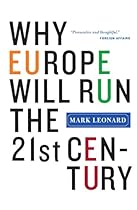Why Europe Will Run the 21st Century

| Author | : | |
| Rating | : | 4.45 (641 Votes) |
| Asin | : | 1586484249 |
| Format Type | : | paperback |
| Number of Pages | : | 170 Pages |
| Publish Date | : | 2015-10-31 |
| Language | : | English |
DESCRIPTION:
In the age of increased globalisation and intensified interdependence, that has the strength of common sense.' Neil Kinnock . It also confirms that, in useful contrast to the unilateralist 'New American Century' doctrine of US Republicans, Europe's contribution to the era will be multilateralist. British Eurosceptics beware.' Will Hutton, author of 'The State We're In' 'Mark Leonard's views are always adventurous and stimulating - and "Why Europe will run the 21st Century" sustains those attributes. 'Mark Leonard deserves to be listened to.' Independent 'Mark Leonard has done that rare thing; he has reshaped how we look at the world This is a refreshing, compelling and above all optimistic book that moves the European debate onto wholly new ground
It draws other countries into its orbit rather than seeking to define itself against them, and as they come under the influence of its laws and customs they are changed forever. Europe, quietly, has rediscovered within its foundations a revolutionary model for the future and an alternative to American hard power. With little fanfare, Europe has pooled the resources and the sovereignty of its nations into a radical new interface – and a power that is discreetly but insistently shaping the path forward. Europe's reach, by contrast, is broad and deep, spreading a value system from Albania to Zambia. Those who believe Europe is weak, ineffectual and sclerotic are wrong. Or so says Mark Leonard, one of Europe's brightest new policy thinkers, in a book sure to stir and provoke his American contemporaries. Europe might look frail and feeble against American military might, but that expression of power is shallow and narrow. America's centralized, militarized supremacy, he argues, has become so overwhelming that
"Post-Nation-State" according to Daniel P. Liderbach. The European Union evolved from a steel-and-coal unionto a confedated union that respects the autonomy-in-unionof the increasing number of members. As the union increasesits breadth and depth, Europe might indeed resume the positionof global leadership that it had exercised prior to the end ofthe Second World War.. The title is misleading but the truth of the matter Europe is leading for economic development. With 27 countries, 500 million people, a GDP which is much higher than Brazil, Russia, India and China (BRIC), Europe Union is advancing its prosperity leaps and bounds.I have visited all 27 countries and 10 more: Croatia, Iceland, Liechtenstein, Montenegro, Norway, Russia, Serbia, Switzerland, Turkey and Ukraine. All of these countries cannot wait to get into European Union, except of course, Russia.One can invest in Europe's. Cool Europa Izaak VanGaalen The title of this book is misleading because no one believes Europe will run the 21st century, including the author himself. Mark Leonard is not saying Europe will have the biggest economy or the most powerful military, rather the European way of doing things will be the model of change in the coming century.In the late 1990's, Leonard was the founder of Tony Blair's think tank, the Foreign Policy Centre, and he was also one of the young turks responsible for the making and the marketing of "cool
Mark Leonard is Director of Foreign Policy at the Centre for European Reform where he works on transatlantic, Middle East, and EU-China relations. A regular commentator in the world's leading newspapers and journals, he lives in London.. Previously he was the director of the Foreign Policy Centre, a "Transatlantic Fellow" at the German Marshall Fund in Washington, D.
